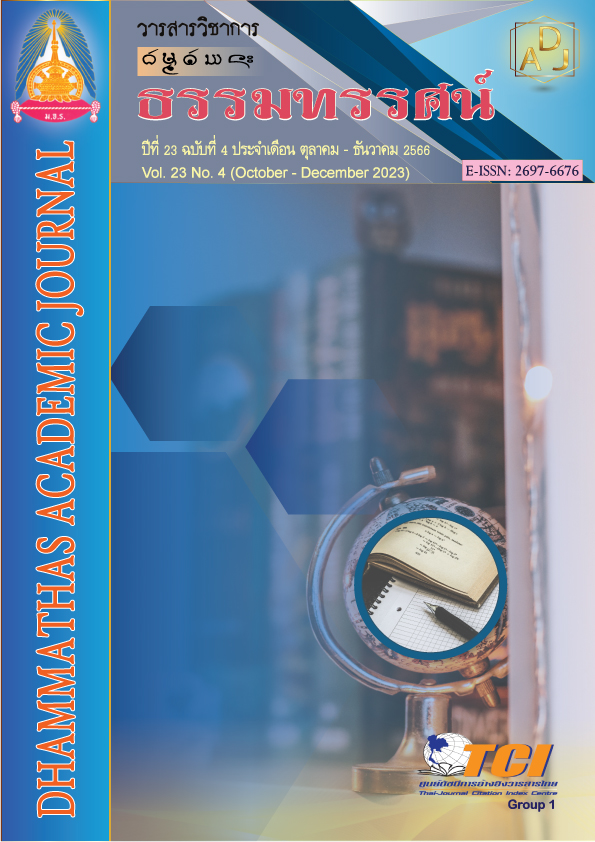Personnel Development Maintains Security by Implementing the Quality Management Cycle in Organization (PDCA) Practice
Main Article Content
Abstract
The purpose of this research is as follows: 1) to study and understand the issues of personnel development and safety management by examining and comprehending the quality management cycle within the organization, 2) to investigate and analyze the potential for personnel development and safety management using the Quality Management Cycle (PDCA) as a practical tool, 3) to propose guidelines for personnel development and safety management by incorporating the Quality Management Cycle (PDCA) into organizational practices. This involves using data from in-depth interviews and group discussions. The main data sources are divided into three groups. 1) Safety management department managers (5 participants). 2) Personnel related to personnel development and safety management (10 participants). 3) Customers utilizing safety management services (3 participants). With each group containing 10 participants, the total number of participants is 40. This research employs qualitative research techniques, including in-depth interviews and group discussions, to gather and analyze data for a qualitative comparative study.
The research findings include:
1. The problem in personnel development for safety management arises from a lack of understanding of the PDCA (Plan-Do-Check-Act) principles in organizational management, leading to inadequate adherence to safety and efficiency protocols.
2. The analysis of potential in personnel development for safety management utilizes the PDCA cycle: Planning involves setting goals for enhancing safety-oriented knowledge and skills, while Action involves implementing activities according to the plan, such as training programs and creating learning resources. Checking evaluates the outcomes to determine goal achievement and Act involves improvements to future plans or training programs.
3. Strategies for personnel development in safety management involve utilizing PDCA. Training employs safety-related equipment, skill development for emergency response, and team-building activities to enhance safe work practices.
Article Details

This work is licensed under a Creative Commons Attribution-NonCommercial-NoDerivatives 4.0 International License.
เพื่อให้เป็นไปตามกฎหมายลิขสิทธิ์ ผู้นิพนธ์ทุกท่านต้องลงลายมือชื่อในแบบฟอร์มใบมอบลิขสิทธิ์บทความ ให้แก่วารสารฯ พร้อมกับบทความต้นฉบับที่ได้แก้ไขครั้งสุดท้าย นอกจากนี้ ผู้นิพนธ์ทุกท่านต้องยืนยันว่าบทความ ต้นฉบับที่ส่งมาตีพิมพ์นั้น ได้ส่งมาตีพิมพ์เฉพาะในวารสาร วิชาการธรรม ทรรศน์ เพียงแห่งเดียวเท่านั้น หากมีการใช้ ภาพหรือตารางของผู้นิพนธ์อื่นที่ปรากฏในสิ่งตีพิมพ์อื่นมาแล้ว ผู้นิพนธ์ต้องขออนุญาตเจ้าของลิขสิทธิ์ก่อน พร้อมทั้ง แสดงหนังสือที่ได้รับการยินยอมต่อบรรณาธิการ ก่อนที่บทความจะได้รับการตีพิมพ์References
กอแก้ว จันทร์กิ่งทอง. (2557). อิทธิพลของพฤติกรรมระดับบุคคล กลุ่ม และองค์การที่มีต่อผลการดำเนินงานของสถานีตำรวจเพื่อประชาชนในงานด้านการรักษาความปลอดภัยในชีวิตและทรัพย์สิน. วารสารวิชาการมหาวิทยาลัยหอการค้าไทย, 34(2), 31-41.
ณัฐพงศ์ บุญเหลือ. (2561). เอกสารประกอบการบรรยายกระบวนวิชาองค์การและนวัตกรรมองค์การ. กรุงเทพฯ: มหาวิทยาลัยรามคำแหง, โครงการรัฐประศาสนศาสตรมหาบัณฑิต.
ณัฐวรรธน์ ศิริเตชภัทร์, กานต์สิรี อู่อรุณ และณิดาวรีย์ เตชรัชต์พสุ. (2561). การพัฒนาโปรแกรมบริหารจัดการงานบุคลากรและจัดการกำลังคนทดแทนการขาดงานของพนักงานรักษาความปลอดภัย. วารสารการอาชีวศึกษาภาคกลาง, 2(2), 46-50.
ปนัดดา ศรีแจ่ม, สุกัญญา หรูลักษณานนท์ และณัดดา ทิพย์จันทา. (2563). ความพึงพอใจต่อการฝึกอบรมหัวหน้าพนักงานต้อนรับบนเครื่องบินด้านความปลอดภัย กรณีศึกษา: บริษัท การบิน กรุงเทพ จำกัด (มหาชน). การประชุมวิชาการและนำเสนอผลงานวิจัยระดับชาติ ราชธานีวิชาการ ครั้งที่ 5, 29 พฤษภาคม 2563, (หน้า 651-657). กรุงเทพฯ: สถาบันพัฒนาบุคลากรทางการบิน มหาวิทยาลัยเกษมบัณฑิต วิทยาเขตร่มเกล้า.
รุจน์ เฉลยไตร และคณะ. (2565). การพัฒนาหลักสูตรฝึกอบรมสมรรถนะวิชาชีพของผู้ปฏิบัติงานรักษาความปลอดภัยประจำท่าเรือที่มีลักษณะพิเศษ. วารสารพุทธจิตวิทยา, 7(2), 157-171.
สมาคมผู้ประกอบการรักษาความปลอดภัยแห่งประเทศไทย. (2558). ร่างพระราชบัญญัติธุรกิจรักษาความปลอดภัย. เข้าถึงได้จาก http:/www.securitythaicenter.com/Lastest?102
สุภางค์ จันทวานิช. (2559). วิธีการวิจัยเชิงคุณภาพ. (พิมพ์ครั้งที่ 24). กรุงเทพฯ: จุฬาลงกรณ์มหาวิทยาลัย.
Joseph, C. F. (1993). Total Quality for Schools: A Suggestion for American Education. Wisconsin: American Society for Quality.
Kingston, C. and Dzamesi, Y. (2012). The Effects of Training of Training and Development on Employees’ Performance in the Hunger Project Ghana. Retrieved from http://hdl.handle.net/123456789/4939
Mycoted. (2004). Plan Do Check Act (PDCA). Retrieved from http://www.mycoted.com/creativity/techniques/pdca.php
Petersen, E. & Plowman, G. E. (2012). Business Organization and Management. New York: Literary License.
Taba, H. (1962). Curriculum development: Theory and practice. New York: Harcourt, Brace & World.

